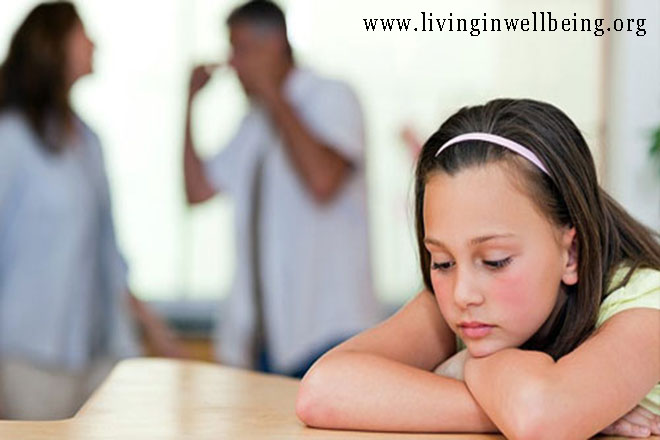
These days, it is hard to come by an individual who does not know someone who has been divorced, or who has not been divorced themselves. In Hollywood, divorce is seemingly becoming a common occurrence, while paving the way for a society where we're not only getting married later in life, but also searching for an almost unrealistic level of happiness in our marriage.
Many couples considering divorce refuse to believe that divorce can have a negative effect on their children. But many studies have been conducted that prove otherwise.
A long term study released in 2002 by the Institute for American Values found that “unhappily married adults who divorced were no more likely to report emotional or psychological improvements than those who stayed married.
According to this study, divorce does in fact NOT improve your emotional health. I think it would be safe to assume that this is due to the stress and financial burden divorce inflicts upon couples.
Here's another fact you might not know...
The Institute for American Values study found that almost eight out of 10 couples who avoided divorce were happily married five years later. Surprising, isn't it?
Here's another fact...
Half of all American children will witness the breakup of a parent’s marriage. Of these, close to half will also see the breakup of a parent’s second marriage.” (Furstenberg, Peterson, Nord, and Zill, “Life Course”)
Many couples divorce, and then remarry without knowing the true cause of their marriage problems in the first marriage. This is why the second marriage divorce rate is even higher than that of the first marriage!
Here's are some statistics specifically about the effects of divorce on children...
- Studies in the early 1980’s showed that children in repeat divorces earned lower grades and their peers rated them as less pleasant to be around. (Andrew J. Cherlin, Marriage, Divorce, Remarriage –Harvard University Press 1981)
- Forty percent of children growing up in America today are being raised without their fathers. (Wade, Horn and Busy, “Fathers, Marriage and Welfare Reform” Hudson Institute Executive Briefing, 1997)
- Teenagers in single-parent families and in blended families are three times more likely to need psychological help within a given year. (Peter Hill “Recent Advances in Selected Aspects of Adolescent Development” Journal of Child Psychology and Psychiatry 1993)
- Compared to children from homes disrupted by death, children from divorced homes have more psychological problems. (Robert E. Emery, Marriage, Divorce and Children’s Adjustment” Sage Publications, 1988)
That statistic is truly amazing, isn't it? But let me continue on...here are are some more shocking statistics on the effect of divorce on children...
- Children living with both biological parents are 20 to 35 percent more physically healthy than children from broken homes. (Dawson, “Family Structure and Children’s Health and Well-being” Journal of Marriage and the Family)
- Most victims of child molestation come from single-parent households or are the children of drug ring members. (Los Angles Times 16 September 1985 The Garbage Generation)
- A Child in a female-headed home is 10 times more likely to be beaten or murdered. (The Legal Beagle, July 1984, from “The Garbage Generation”)
- The study of children six years after a parental marriage breakup revealed that even after all that time, these children tended to be “lonely, unhappy, anxious and insecure". (Wallerstein “The Long-Term Effects of Divorce on Children” Journal of the American Academy of Child and Adolescent Psychiatry 1991)
- Children of divorce are four times more likely to report problems with peers and friends than children whose parents have kept their marriages intact. (Tysse, Burnett, “Moral Dilemmas of Early Adolescents of Divorced and Intact Families. Journal of Early Adolescence 1993)
- Children of divorce, particularly boys, tend to be more aggressive toward others than those children whose parents did not divorce. (Emery, “Marriage, Divorce and Children’s Adjustment, 1988)
- Children of divorce are at a greater risk to experience injury, asthma, headaches and speech defects than children whose parents have remained married. (Dawson, “Family Structure and Children’s Health and Well Being” National Health Interview Survey on Child Health, Journal of Marriage and the Family)
- People who come from broken homes are almost twice as likely to attempt suicide than those who do not come from broken homes. (Velez-Cohen, “Suicidal Behavior and Ideation in a Community Sample of Children” Journal of the American Academy of Child and Adolescent Psychiatry 1988)
- Children of divorced parents are roughly two times more likely to drop out of high school than their peers who benefit from living with parents who did not divorce. (McLanahan, Sandefur, “Growing Up With a Single Parent: What Hurts, What Helps” Harvard University Press 1994)
- Seventy percent of long-term prison inmates grew up in broken homes. (Horn, Bush, “Fathers, Marriage and Welfare Reform)
- Following divorce, children are fifty percent more likely to develop health problems than two parent families. (Angel, Worobey, “Single Motherhood and Children’s Health”)
- Of all children born to married parents this year, fifty percent will experience the divorce of their parents before they reach their 18th birthday. (Fagan, Fitzgerald, Rector, “The Effects of Divorce On America)
I hope these statistics may eventually cause you (or your spouse) to seriously consider all the consequences of divorce before you make that final decision.
Based on these statistics, it becomes obvious that children need stable, loving homes with both mom and dad. There is, of course an exception to every rule, and in this case it is households where abuse is taking place. Children should under no circumstances remain in an abusive atmosphere that is unsafe for them.
But if there is no abuse taking place in your marriage and the two of you have simply "grown apart",or fell out of love, I urge you to seek out help for your marriage before you give up completely. For your children's sake, even if you're feeling hopeless right now, get help for your marriage today.












